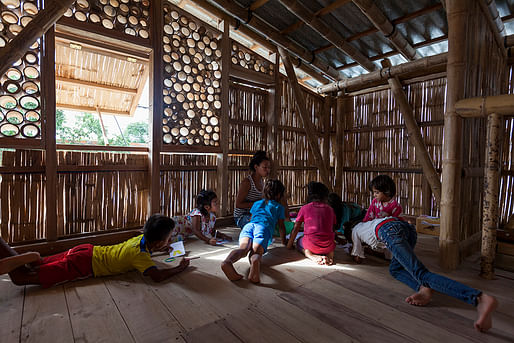
Portland, OR
Portland State University School of Architecture’s Center for Public Interest Design has been honored by the 2018 SEED + Pacific Rim Awards for their work on two collaborative design-build projects: a Cultural Center in Chamanga, Ecuador, and the Kenton Women’s Village in Portland, Oregon.
The SEED Network jury selected the Cultural Center Chamanga in San Jose de Chamanga, Ecuador, to receive one of the six SEED + Pacific Rim Awards for 2018.
PSU faculty and students helped to design and create the new cultural center in response to the 2016 earthquake, which destroyed the headquarters of a local organization that is integral to the small fishing community, providing dance, music, and other cultural activities for the town’s young people. An auditorium, dance studio, library, audio studio, office, and bathrooms were among the requirements for the project. The design work included significant work with the local community to invite them into the decision-making process.
Three higher-educational institutions from three continents joined forces in this project: Portland State University, Munich University of Applied Sciences in Germany, and University of Tokyo in Japan. Faculty and students from each institution contributed design, planning, and construction expertise at various stages of the process. Local architects and artisans also contributed to the creation of the structure.
“The collaborative nature of this project, which brought together so many designers and academics from around the world, is what made it so exciting and meaningful to my students, my colleagues and myself,” said Prof. Sergio Palleroni, director of the Center for Public Interest Design.
“For us at the CPID, this project was a groundbreaking opportunity, in the aftermath of the quake, to be involved as first responders in planning the recovery with the community, listening to the community, and helping to construct the building that everyone agreed was most needed,” continued Palleroni.
PSU architecture and public-interest-design students traveled to Ecuador in the summer of 2017 to launch the design, community engagement, and construction of the project over the course of three weeks. Architecture students and CPID research/design staff continued working on the project from Portland for the next year.
The SEED Awards criteria called for projects that showed a high level of community participation, effectiveness, excellent, inclusiveness, impact, and scalability.
The jury commented on the project’s “excellent design,” calling out the “multiple design workshops with the community” and its use of “local low-tech techniques,” which make it more accessible for replication. They called it “a very good example of post-earthquake rehabilitation project,” and suggested that “maybe the best part of the project is not the building but the process – something that many other projects like this could learn.”

The Kenton Women’s Village, a project of the PSU School of Architecture’s Center for Public Interest Design, also earned an Honorable Mention from the Pacific Rim Community Design Network as part of the SEED Awards. The Pacific Rim Awards criteria called for projects that demonstrated a high level of community engagement, impact, and design.
A joint endeavor by Design Corps, Social Economic Environmental Design (SEED), and the Pacific Rim Community Design Network, the SEED + Pacific Rim Awards recognize excellence in public interest design. The jury for each of the three organizations selected the projects that exemplified the “greater global scale and growing relationships needed to create truly sustainable projects and positive change in all communities,” according to the organizations’ announcement of the winning projects.
Learn more at the 2018 SEED + Pacific Rim Awards web page.
No Comments
Block this user
Are you sure you want to block this user and hide all related comments throughout the site?
Archinect
This is your first comment on Archinect. Your comment will be visible once approved.